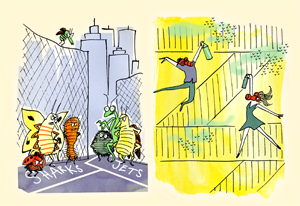Insects or insecticides?

Insecticides arguably make our lives better. They control insect-borne diseases like malaria and west nile virus. They improve crop yields, staving off famine in developing countries and providing cheaper food for everyone. We kill termites to preserve our homes; we poison grubs to give our lawns more curb-appeal.
It's also true that modern products are less toxic to humans than earlier insecticides, and that they break down faster in the environment.
But if there's one lesson that ecology teaches us again and again, it's that intervention often has unintended consequences. As we destroy disease-bearing insects and agricultural pests, we also kill pollinator insects like bees, reducing crop yields. While we kill grubs in our lawn, we also eliminate the beneficial species that aerate the soil and help break down organic matter. Runoff from insecticide application can kill aquatic insects, important prey for fish. And persistent insecticide use can ultimately lead to the evolution of resistance, much as the misuse of antibiotics caused the emergence of drug-resistant bacteria like MRSA. Then we're stuck with all of the costs and none of the benefits of insecticides.
It may be useful to look at the choice from both a societal and personal perspective. When are we choosing insecticides to address serious problems, and when are we using them for more trivial reasons? There's certainly a place for insecticides in disease prevention—although even here, we have to carefully weigh the benefits against the harm (both to the environment and human health).
On the personal level, the choice is easier, at least for me. I'm willing to put up with grubs and ants in my lawn to avoid insecticide exposure and damage to our local ecosystem.
—Wade Powell. Powell, an associate professor of biology, is a molecular biologist and environmental toxicologist. He directs a research program investigating the effects of dioxin-like pollutants on the gene expression, physiology, and development of aquatic vertebrates, including amphibians, reptiles, and fish.

 Delicious
Delicious Facebook
Facebook StumbleUpon
StumbleUpon Digg
Digg reddit
reddit